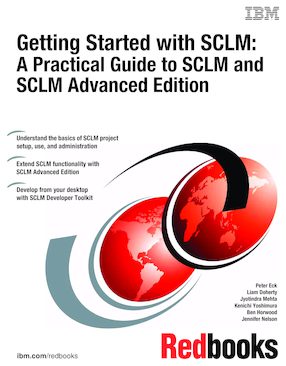Getting Started with SCLM: A Practical Guide to SCLM and SCLM Advanced Edition
An IBM Redbooks publication
Note: This is publication is now archived. For reference only.

Published on 06 September 2007
ISBN-10: 0738489468
ISBN-13: 9780738489469
IBM Form #: SG24-7392-00
Authors: Joe DeCarlo, Peter Eck, Liam Doherty, Jyotindra Mehta, Kenichi Yoshimura, Ben Horwood and Jennifer Nelson
This IBM Redbooks publication describes and documents a number of different aspects of the Software Configuration and Library Manager (SCLM).
Part 1 of the book focuses on setting up an SCLM project using commonly used languages such as COBOL and PL/I. Additionally, migration techniques are discussed for those customers considering migrating to SCLM from other vendor Software Configuration Management products.
Part 2 describes basic usage of SCLM functions such as Edit, Build, and Promote.
Part 3 goes a bit beyond the basics and looks at some of the newer functions that are being added to SCLM, along with writing user exits and setting up SCLM for debugging with IBM Debug Tool.
Parts 4, 5, and 6 concentrate on the SCLM Advanced Edition products such as Breeze, Enhanced Access Control, SCLM Developer Toolkit, and SCLM Administrator Toolkit. These sections describe what these products are and how they can be set up and used to aid your application development.
Part 1. Basic setup and migration
Chapter 1. SCLM project setup
Chapter 2. Defining languages translators for traditional compliers: Assembler, COBOL, and PL/I
Chapter 3. Writing DB2 translators and bind processing
Chapter 4. Migrating to SCLM
Chapter 5. SCLM architecture definition considerations
Part 2. Using SCLM
Chapter 6. Using SCLM edit
Chapter 7. Building members in SCLM
Chapter 8. Promoting up the hierarchy with SCLM
Chapter 9. SCLM utilities
Part 3. SCLM: Beyond the basics
Chapter 10. Member level locking
Chapter 11. NOPROM function
Chapter 12. SCLM user exit processing
Chapter 13. Creating language definitions from JCL
Chapter 14. Debugging and fault analysis with SCLM
Part 4. SCLM: Advanced topics
Chapter 15. Breeze for SCLM - installation, setup, and use
Chapter 16. Enhanced Access Control: Bridging the gap - SCLM to RACF
Part 5. SCLM Advanced Edition: Developing with the SCLM Developer Toolkit
Chapter 17. Merge Tool
Chapter 18. Open Systems basics
Chapter 19. SCLM Developer Toolkit configuration
Chapter 20. SCLM Developer Toolkit for mainframe development
Chapter 21. SCLM Developer Toolkit for Java Applications
Chapter 22. Deployment with SCLM Developer Toolkit
Part 6. SCLM Administrator Toolkit
Chapter 23. IBM SCLM Administrator Toolkit
Chapter 24. Introduction to the IBM SCLM Administrator Toolkit
Chapter 25. Beyond the basics: A case study
Appendix A. Chapter 1 listings
Appendix B. Chapter 2 listings
Appendix C. Chapter 3 listings
Appendix D. Chapter 13 listings
Appendix E. DDname substitution lists
Appendix F. Additional material